If you’ve ever dealt with tiny, sap-sucking insects attacking your plants, leaving behind curled leaves and weakened stems, you’re not alone. Aphids are among the most common garden pests, and their rapid reproduction makes them even harder to control. To make matters worse, these tiny invaders attract even more trouble by drawing in ants and other insects that thrive on the sticky honeydew they leave behind.
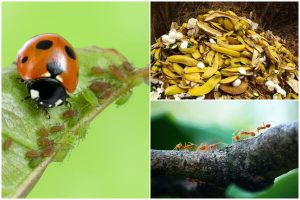
Many gardeners resort to chemical pesticides, but these can be harmful to beneficial insects, soil health, and even your own plants in the long run. What if there were a natural, eco-friendly way to keep aphids at bay—using something you probably already have in your kitchen?
Enter banana peels—an unexpected yet highly effective solution for repelling aphids and nourishing your plants at the same time. These everyday kitchen scraps are packed with essential nutrients like potassium and phosphorus, which not only boost plant health but also help deter these pesky insects. Let’s explore how banana peels can be a game-changer for your garden and why they work so well as a natural aphid repellent.
Why Banana Peels Work as an Aphid Repellent
1. Aphids Hate the Smell of Banana Peels
Aphids rely heavily on their sense of smell to locate host plants, and certain odors can interfere with their ability to feed and reproduce. Banana peels contain organic compounds that give off a scent that aphids find unappealing. When placed around plants, the strong aroma confuses and repels them, making your garden a far less attractive feeding ground.
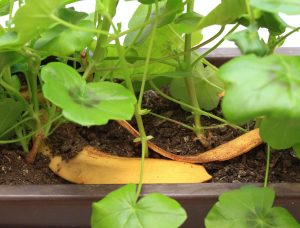
Over time, as aphids struggle to locate their preferred plants, their populations naturally decrease. This simple yet effective method helps reduce the need for chemical pesticides while keeping your garden thriving in a completely natural way.
2. A Natural Pest Barrier Without Harmful Chemicals
Many store-bought pesticides are effective at eliminating pests, but they often come with a downside—they can harm beneficial insects like bees, butterflies, and ladybugs, which play a crucial role in pollination and pest control. Using banana peels as a natural aphid repellent offers a chemical-free, eco-friendly alternative that helps keep your garden healthy without disrupting its delicate ecosystem.
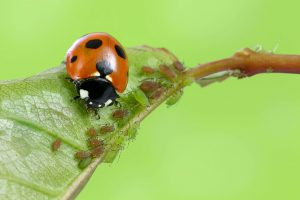
As banana peels decompose, they release enzymes and natural compounds that create an environment aphids dislike. These compounds deter pests without introducing any harmful toxins into the soil or affecting the growth of your plants. If you’re committed to organic gardening and want a solution that aligns with sustainable practices, banana peels are a simple yet highly effective choice.
3. Nourishes the Soil While Keeping Pests Away
Banana peels do more than just ward off aphids—they also act as a natural fertilizer that improves soil health. Packed with essential nutrients like potassium, calcium, and magnesium, they break down over time, enriching the soil and strengthening plant roots.
Stronger plants are naturally more resistant to pests and diseases, reducing the likelihood of aphid infestations in the first place. When your plants receive the right balance of nutrients, they develop thicker, more resilient leaves, making it harder for aphids to feed and reproduce. By incorporating banana peels into your garden, you’re not just repelling pests naturally—you’re also promoting long-term plant health and vitality.
4. Disrupts the Aphid Reproduction Cycle
Aphids are notorious for their rapid reproduction, with some species giving birth to live offspring within days. A single aphid can quickly lead to a full-blown infestation, damaging plants and attracting even more pests. However, banana peels can help slow down their population growth naturally.
Research suggests that natural compounds found in banana peels create an inhospitable environment for aphid eggs and larvae, making it difficult for them to thrive. When regularly placed around the base of your plants or incorporated into compost, banana peels can interfere with their breeding cycle, reducing the number of new aphids hatching in your garden.
Over time, this method helps keep aphid populations under control without the need for chemical pesticides, making it an excellent addition to any organic pest management strategy.
5. Attracts Beneficial Insects That Prey on Aphids
Banana peels do more than just deter aphids—they also help attract beneficial insects that naturally keep aphid populations in check. Predatory insects like ladybugs, lacewings, and hoverflies actively seek out aphids as a primary food source, and by using banana peels in your garden, you can create an environment that encourages these helpful bugs to stay.
When banana peels decompose, they enrich the soil and release a subtle scent that can attract these natural predators. By incorporating banana peel-infused compost or burying peels near the roots of plants, you enhance soil health while also fostering a balanced ecosystem where beneficial insects can thrive. This natural pest control strategy helps ensure long-term aphid management while supporting biodiversity in your garden.
6. Reduces Ant Activity, Helping to Control Aphid Infestations
Did you know that ants and aphids have a symbiotic relationship that can worsen infestations? Ants actively protect aphids from natural predators like ladybugs and lacewings because they feed on the sweet honeydew that aphids secrete. This means that as long as ants are present, they will continue to shield aphid colonies, allowing them to multiply unchecked.
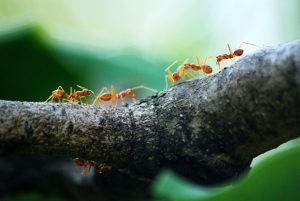
Banana peels help break this cycle by repelling ants naturally. The strong scent and certain organic compounds in banana peels act as a deterrent, discouraging ants from swarming around your plants. When ants are no longer present to guard them, aphids become far more vulnerable to their natural enemies, leading to a gradual decline in their population.
By incorporating banana peels into your gardening routine, you’re not just controlling aphids—you’re also disrupting the pest ecosystem that allows them to thrive. This makes banana peels a powerful and eco-friendly pest management tool for any organic garden.
7. Provides a Slow-Release Nutrient Source for Healthier Plants
Unlike synthetic fertilizers that deliver nutrients in a rapid burst—sometimes overwhelming plants—banana peels decompose gradually, slowly releasing essential nutrients like potassium, phosphorus, and calcium into the soil over time. This steady nutrient supply strengthens plant roots, encourages lush foliage, and improves overall resilience against pests and diseases.
Potassium, in particular, plays a vital role in boosting plant immunity, helping plants withstand aphid damage, drought stress, and fungal infections. By simply burying banana peels near plant roots or adding them to compost, you’re enriching the soil in a natural, chemical-free way while simultaneously keeping aphid populations under control.
With healthier plants and fewer pests, your garden can thrive without the need for synthetic fertilizers or harsh pesticides, making banana peels a must-have addition to any sustainable gardening practice.
8. A Simple, Cost-Free, and Sustainable Pest Control Solution
Why spend money on expensive chemical pesticides when you can use an all-natural solution that comes straight from your kitchen? Banana peels offer an eco-friendly, cost-effective way to manage aphid infestations while also improving soil health. Unlike synthetic pest control methods that may introduce harmful toxins into your garden, banana peels provide a completely organic approach that is safe for plants, beneficial insects, and the environment.
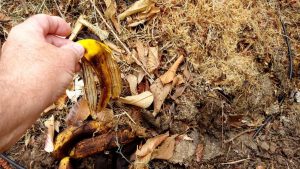
By repurposing banana peels, you’re not just protecting your garden from pests—you’re also reducing food waste and promoting sustainability. Instead of tossing peels into the trash, you can turn them into a powerful gardening ally that naturally deters aphids and nourishes plants. It’s a win-win for both your garden and the planet!
How to Use Banana Peels to Repel Aphids
If you’re ready to try this natural aphid control method, here are two simple and effective ways to incorporate banana peels into your gardening routine.
Method 1: Direct Placement Around Plants
This method is ideal for long-lasting aphid protection and gradual soil enrichment.
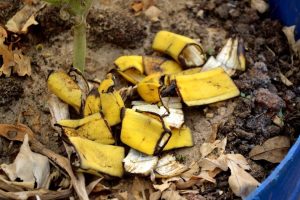
What You Need:
✔ Fresh banana peels
✔ Scissors
✔ Garden soil
Instructions:
1️⃣ Cut banana peels into small strips to speed up decomposition and maximize their pest-repelling effects.
2️⃣ Place the strips around the base of plants that aphids commonly attack, such as roses, tomatoes, peppers, and beans.
3️⃣ Lightly cover the peels with soil to prevent attracting fruit flies while still allowing nutrients to seep into the ground.
4️⃣ Replace the banana peels every 7-10 days as they break down, ensuring a continuous barrier against aphids.
🔹 Pro Tip: You can also bury banana peels near plant roots before planting to provide a slow-release source of potassium and phosphorus, which strengthens plants and helps deter pests naturally.
Method 2: DIY Banana Peel Spray for Aphids
For a quick-action aphid repellent, try making a simple banana peel spray that can be applied directly to affected plants.
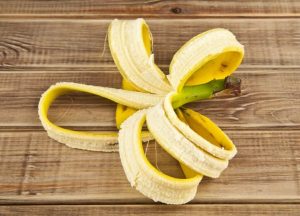
What You Need:
✔ 1 banana peel
✔ 2 cups of water
✔ 1 spray bottle
✔ A blender or food processor
✔ A fine strainer
Instructions:
1️⃣ Blend the banana peel with 2 cups of water until you achieve a smooth consistency.
2️⃣ Strain the mixture to remove any solid particles that could clog the spray nozzle.
3️⃣ Pour the liquid into a spray bottle and shake well before use.
4️⃣ Spray directly onto aphid-infested plants, focusing on the undersides of leaves, where aphids tend to hide and reproduce.
5️⃣ Reapply every 3-5 days to maintain effectiveness and keep aphids away.
🔹 Bonus Tip: This spray also attracts beneficial insects like ladybugs and lacewings, which help control aphid populations naturally.
Method 3: Banana Peel Compost – A Natural Way to Boost Plant Health and Keep Pests Away
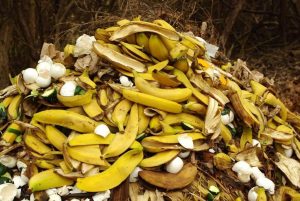
What You’ll Need:
- Several banana peels
- A compost bin, container, or compost pile
Step-by-Step Instructions:
- Prepare the Banana Peels – Start by chopping banana peels into small pieces. This helps accelerate the decomposition process, ensuring that nutrients become available to your plants more quickly.
- Add to Compost – Place the chopped banana peels into your compost bin or pile along with other organic waste, such as vegetable scraps, coffee grounds, and dry leaves. This creates a well-balanced compost mixture rich in essential nutrients.
- Mix Into Garden Soil – Once the compost has fully broken down, incorporate it into your garden soil. This improves soil structure, boosts plant growth, and enhances resistance to common pests like aphids.
- Use as a Slow-Release Fertilizer – Alternatively, you can sprinkle the composted banana peels around the base of your plants every few weeks. This method provides a steady supply of potassium and phosphorus, promoting healthier roots, stronger stems, and vibrant blooms.
Cautions and Precautions
- Avoid Using Whole Banana Peels Directly – Placing whole banana peels on the soil surface may attract rodents, fruit flies, or other unwanted pests. Instead, always chop them into smaller pieces or bury them slightly beneath the soil.
- Use in Moderation – While banana peels are rich in potassium, excessive amounts can disrupt the natural nutrient balance of the soil. To maintain a healthy ecosystem, use them in combination with other compost materials.
- Test Before Using Banana Peel Spray – If you’re making a banana peel spray as a natural fertilizer or pest repellent, always test it on a small area first. This helps ensure that it won’t attract pests or cause sensitivity in delicate plants.
This guide is intended for informational purposes only and should not replace professional gardening advice. Before applying any natural remedy on a large scale, test it in small amounts to observe its effects on your plants and soil.


